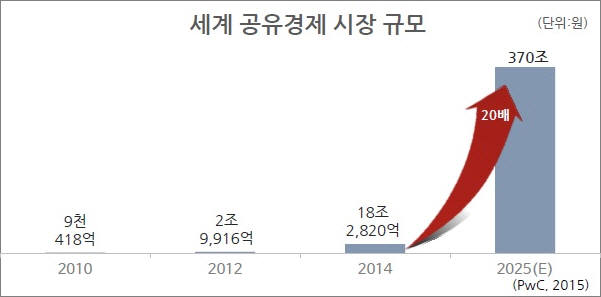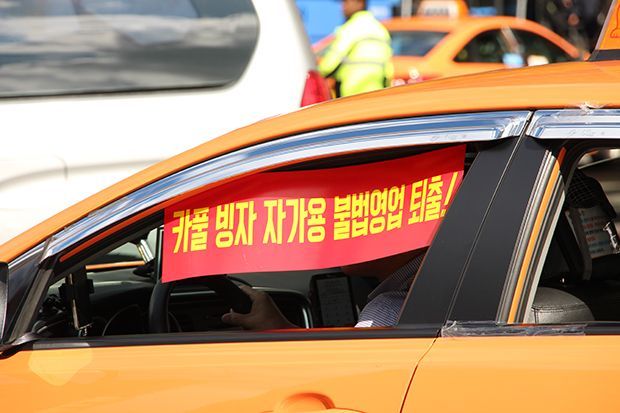List
Story > NEWS > Detail
[News] Shared Economy and Lack of Regulations
The development of the Internet has brought about many changes in the living environment of mankind. People can exchange views and create knowledge in a new space called the Internet, regardless of distance and time. Furthermore, the deployment of smartphones has provided an environment for freeing the above activities anytime, anywhere. These changes have enabled things that were only theoretically possible due to restrictions in time and space in the past. One of them is the sharing economy, which first emerged in 2008 when the concept was presented. Shared economy was first introduced by Lawrence Lessig, a professor at Harvard Law School, who described a shared economy as an economic activity in which the owners of existing products share the product with others, unlike the conventional commercial economy where the production and ownership of the product was the main focus. In particular, it states that the development of the Internet has expanded the scope and depth of the traditional shared economy that existed, enabling new types of shared economies. Resik cited Wikipedia, a project in which individuals share knowledge, and the Gutenberg Project, a project that digitizes and distributes classics such as the Declaration of Independence.

<The Gutenberg Project>
The shared economy started to become the talk of the town in earnest because it was a form of economic activity outside the traditional commercial economic framework. Essentially, on the basis of the concept of ownership, collaborative consumption is achieved in a shared economy, unlike a commercial economy in which producers generate profits and consumers consume goods alone. Shared economic participants regard not only economic values but also social and environmental values as important values to be created. The shared economy, which introduced itself to the world, began to grow with explosive growth. In Europe, the volume of shared economic transactions rose 56 percent to 15.9 billion euros in 2014, compared with 10.2 billion euros in 2013, and a 77 percent increase there to 28.1 billion euros in 2015. The platform operator's profits also rose 80 percent to 1.8 billion euros in 2014 from 1 billion euros in 2013 and another 97 percent to 3.6 billion euros in 2015.

<World Shared Economic Growth Scale>
The areas of the business where the shared economy takes place are also shared rides, shared accommodation, shared housekeeping services, and crowdfunding. It has been expanded to a variety of areas, including shared experience and knowledge. If the Internet of Things (IoT, Internet of Things) develops in the future, making it easier to control and manage each object remotely, the shared economy is highly likely to continue to grow. The shared economy is creating new sources of income everywhere, particularly by allowing the economically weak to act as new capital owners, which previously only provided labor for others. It also serves as a platform for realizing the long-tail market by enabling supply to respond to diverse demands. Environmental protection is also indispensable. It is also expected to reduce environmental damage further by curbing the production of unnecessary resources and sharing existing resources.

<Photo Source: ZDnet>
Despite this rosy future for a shared economy, however, the current problems arising from the shared economy are also formidable. A case in point is the clash with the taxi industry last year when Kakao tried to introduce carpooling services in Korea. As soon as I see the move to impose a pool of cacao taxi unions claim the service is actually a car pool was equal to the unlicensed cab driver and it can not be the fourth round of the Industrial Revolution.Started strongly for the introduction of the opposition. In the process, a taxi driver who opposed the introduction of carpooling services took place for the first time, followed by two additional burn-offs. This sharing of economy and divisions over the introduction of the silk and our own work, competitive service operators clash with the only problem, Oh Nida. Uber other side of the taxi industry for (uber) protests take place around the world, and Uber only in London until 5. 6.. typically 2019 of different suppliers of 2,500.Suppliers charged with sexual assault, stalking and dangerous driving can be seen in a crime problems such as shares, as creating noise in relation to the economy.

These issues can be one of many causes, but most fundamentally can be as the cause ‘(regulatory loophole) the absence of regulations’. Existing competitive service operators are sharing economic players gaining profits that these blank using unfair regulation. The sharing economy is actually the shares driven economic growth, without the legal system that is still maintained the absence of regulation even has to take up shares.They also considered to be. The current existing competitive service operators for the participants sharing economy due to the absence of regulations that apply to entry regulation, regulation does not apply, such as an act or whether or not to apply.There is an argument continued and eventually sharing economy in order to solve the bar, the current situation in which appropriate to the imposition of the regulations are need to take place as soon as possible.
The development of the Internet has brought about many changes in the living environment of mankind. People can exchange views and create knowledge in a new space called the Internet, regardless of distance and time. Furthermore, the deployment of smartphones has provided an environment for freeing the above activities anytime, anywhere. These changes have enabled things that were only theoretically possible due to restrictions in time and space in the past. One of them is the sharing economy, which first emerged in 2008 when the concept was presented. Shared economy was first introduced by Lawrence Lessig, a professor at Harvard Law School, who described a shared economy as an economic activity in which the owners of existing products share the product with others, unlike the conventional commercial economy where the production and ownership of the product was the main focus. In particular, it states that the development of the Internet has expanded the scope and depth of the traditional shared economy that existed, enabling new types of shared economies. Resik cited Wikipedia, a project in which individuals share knowledge, and the Gutenberg Project, a project that digitizes and distributes classics such as the Declaration of Independence.

<The Gutenberg Project>
The shared economy started to become the talk of the town in earnest because it was a form of economic activity outside the traditional commercial economic framework. Essentially, on the basis of the concept of ownership, collaborative consumption is achieved in a shared economy, unlike a commercial economy in which producers generate profits and consumers consume goods alone. Shared economic participants regard not only economic values but also social and environmental values as important values to be created. The shared economy, which introduced itself to the world, began to grow with explosive growth. In Europe, the volume of shared economic transactions rose 56 percent to 15.9 billion euros in 2014, compared with 10.2 billion euros in 2013, and a 77 percent increase there to 28.1 billion euros in 2015. The platform operator's profits also rose 80 percent to 1.8 billion euros in 2014 from 1 billion euros in 2013 and another 97 percent to 3.6 billion euros in 2015.

<World Shared Economic Growth Scale>
The areas of the business where the shared economy takes place are also shared rides, shared accommodation, shared housekeeping services, and crowdfunding. It has been expanded to a variety of areas, including shared experience and knowledge. If the Internet of Things (IoT, Internet of Things) develops in the future, making it easier to control and manage each object remotely, the shared economy is highly likely to continue to grow. The shared economy is creating new sources of income everywhere, particularly by allowing the economically weak to act as new capital owners, which previously only provided labor for others. It also serves as a platform for realizing the long-tail market by enabling supply to respond to diverse demands. Environmental protection is also indispensable. It is also expected to reduce environmental damage further by curbing the production of unnecessary resources and sharing existing resources.

<Photo Source: ZDnet>
Despite this rosy future for a shared economy, however, the current problems arising from the shared economy are also formidable. A case in point is the clash with the taxi industry last year when Kakao tried to introduce carpooling services in Korea. As soon as I see the move to impose a pool of cacao taxi unions claim the service is actually a car pool was equal to the unlicensed cab driver and it can not be the fourth round of the Industrial Revolution.Started strongly for the introduction of the opposition. In the process, a taxi driver who opposed the introduction of carpooling services took place for the first time, followed by two additional burn-offs. This sharing of economy and divisions over the introduction of the silk and our own work, competitive service operators clash with the only problem, Oh Nida. Uber other side of the taxi industry for (uber) protests take place around the world, and Uber only in London until 5. 6.. typically 2019 of different suppliers of 2,500.Suppliers charged with sexual assault, stalking and dangerous driving can be seen in a crime problems such as shares, as creating noise in relation to the economy.

These issues can be one of many causes, but most fundamentally can be as the cause ‘(regulatory loophole) the absence of regulations’. Existing competitive service operators are sharing economic players gaining profits that these blank using unfair regulation. The sharing economy is actually the shares driven economic growth, without the legal system that is still maintained the absence of regulation even has to take up shares.They also considered to be. The current existing competitive service operators for the participants sharing economy due to the absence of regulations that apply to entry regulation, regulation does not apply, such as an act or whether or not to apply.There is an argument continued and eventually sharing economy in order to solve the bar, the current situation in which appropriate to the imposition of the regulations are need to take place as soon as possible.



